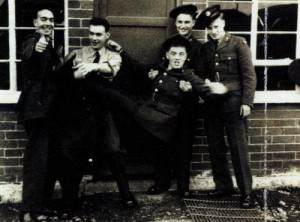
I STOOD to attention and brought my hand up in a smart salute (longest way up, shortest down). As I did I caught the brim of my cap and knocked it clear across the room.
An enormous headdress seemed to fill the office, like two starched pillow slips on end. Beneath it was an alarming pair of Edna Everage glasses.
This was Matron and she was in charge of RAF Hospital Wroughton, near Swindon. She ruled with a rod of iron. We had to scrub that ward immaculately every day. No germs could survive – you could have eaten your food off the floor.
I had been told to report to Matron as soon as I arrived on the base. I was to be one of her nurses: I knew nothing about nursing.
If I’d been born in November, 1939, instead of July, I’d have missed National Service. I’d actually wanted to go in the Navy, but they were only taking regulars for three years, so no thanks.
The RAF was my second choice – I preferred the uniform. They wanted people with a technical bent and you had to take an exam. I knew I’d fail, but the answers were multiple choice, so I slammed ticks anywhere. I passed. Then I was interviewed.
It was clear I knew nothing that was wanted, so I was sent to a hospital to be a nurse.
Pesky kids
Matron told me to report to the children’s ward. I didn’t like kids. Sister Murison, who was in charge, told me, “There’s a ward of starving children. Feed ’em.”
She propelled me to the kitchen, and there were the feed mixes. Another ‘nurse’ National
Serviceman told me how to mix them. Sister then frogmarched me down the ward and told me how to pick up a baby. Believe it or not, I became top dog at weaning.
After that I worked on the officers’ wives’ ward. I preferred the babies.
Although those sisters were tough – they’d had tough training themselves – I came to feel a certain pity for them. They were dedicated to their profession and had worked hard to get where they were. Now they were surrounded by a load of National Servicemen who hadn’t the least interest in what they were doing and couldn’t wait for demob, counting off the days.
Upsides
Although no one had much money, I had the best New Year’s Eve of my life in the NAAFI. I courted Hilda, who worked there, and she used to smuggle me bits of food.
You can get used to anything, even though you may not enjoy it. I made friends that I’ve still got. Gradually, the National Servicemen became fewer and the atmosphere changed. The service was now full of career people who’d signed up for nine years. We still made friends; you have to when you’re billeted with someone, but we had less in common.
When my two years were up I was back in Matron’s office to officially sign off. I saluted impeccably.
It may sound a cliche, but those years did me the world of good. National Service should be brought back – but this time girls should be included, too. Fair’s fair. 4^0 Maurice Leonard, Teddington,
Middlesex








